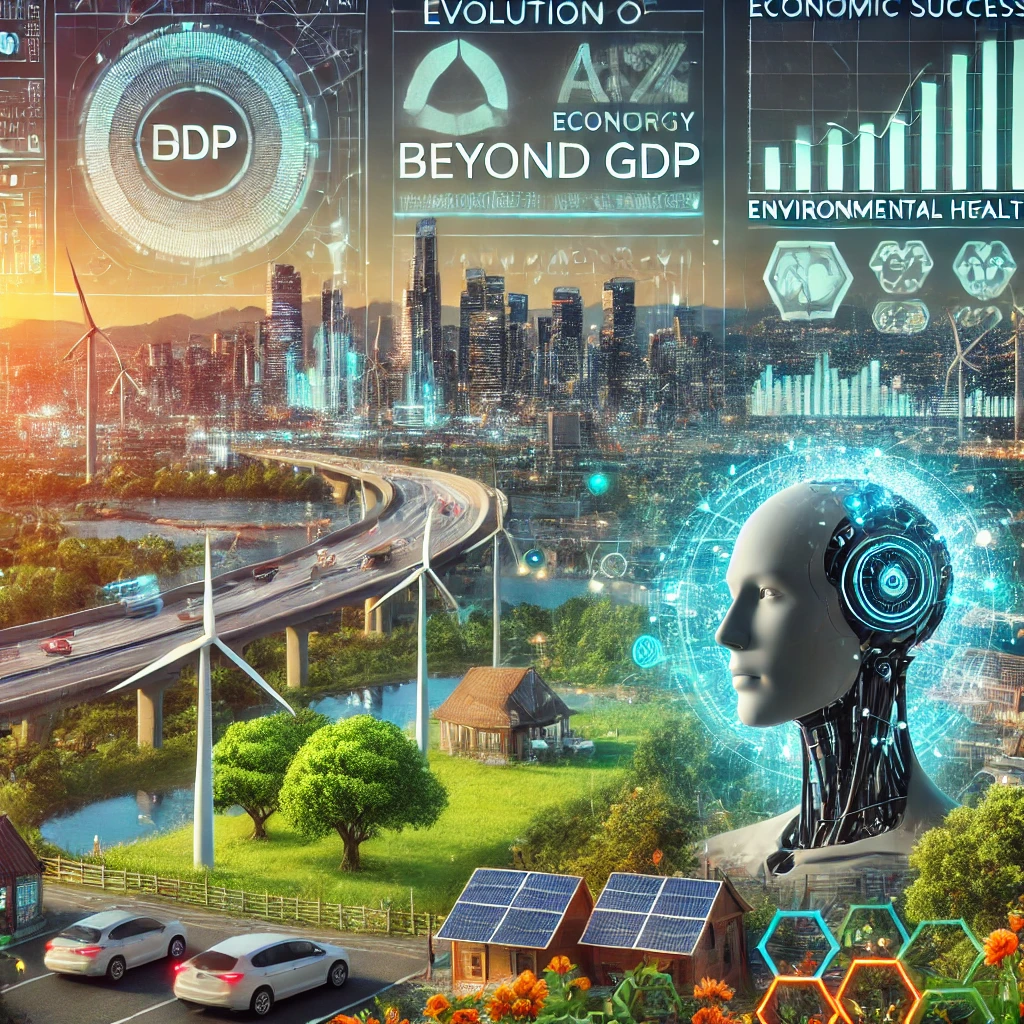Introduction: Rethinking Economic Progress
Beyond GDP: How AI, Well-being, and Climate Economics Will Redefine Success. For decades, Gross Domestic Product (GDP) has been the dominant measure of a nation’s success. Governments, investors, and policymakers have relied on GDP growth as a key indicator of economic health. But as we move into a more complex and interconnected world, it is becoming clear that GDP alone is an inadequate measure of prosperity.
Economic growth does not always equate to human well-being, environmental sustainability, or technological advancement. In fact, an overreliance on GDP can mask deep inequalities, climate degradation, and the true impact of artificial intelligence (AI) on global economies.
This blog explores how AI, well-being metrics, and climate economics are redefining what it means for a nation to be “successful.”
Table of Contents
The Limitations of GDP as a Success Metric
GDP measures the total value of goods and services produced within a country, but it does not capture key aspects of economic and social well-being. Here’s why it falls short:
1. It Ignores Income Inequality
A nation’s GDP can grow while wealth remains concentrated among the richest individuals. Countries with high GDPs often experience increasing disparities in income distribution, leaving large portions of the population struggling financially.
2. It Doesn’t Account for Environmental Damage
GDP does not measure the depletion of natural resources, pollution, or climate impact. A country can experience rapid economic growth while simultaneously destroying ecosystems and accelerating climate change.
3. It Overlooks Well-being and Quality of Life
A rising GDP does not necessarily mean people are happier or healthier. Countries with high economic output can still struggle with poor mental health, stress, overwork, and a lack of social well-being.
4. It Fails to Recognize Automation’s Impact
The rise of AI and automation is reshaping economies, but GDP does not distinguish between job-creating growth and job-displacing growth. If AI replaces millions of workers, GDP might still rise, but unemployment and social unrest could increase.
AI’s Role in Redefining Economic Success
1. AI-Powered Economic Models
Artificial intelligence is revolutionizing how economies are measured and managed. AI-driven analytics can provide real-time insights into employment trends, income distribution, and environmental sustainability. Governments are beginning to incorporate AI-driven economic models that go beyond GDP to assess social progress and sustainability.
2. Automation and Workforce Adaptation
AI is transforming labor markets, increasing efficiency, and reducing costs. However, it also threatens job security in many industries. Nations that successfully integrate AI into workforce planning, retraining programs, and social policies will be better positioned for long-term success.
3. Smart Infrastructure and Resource Management
AI is improving urban planning, energy efficiency, and transportation systems, helping countries transition to more sustainable economic models. AI-driven climate monitoring can also help predict and mitigate environmental risks, allowing for more informed policy decisions.
The Rise of Well-being Economics
1. Gross National Happiness (GNH) and Human Development Index (HDI)
Some countries, such as Bhutan, have already moved beyond GDP by adopting Gross National Happiness (GNH) as a key metric. The United Nations’ Human Development Index (HDI) also incorporates factors like education, life expectancy, and income equality.
2. Mental Health and Work-Life Balance
Nations that prioritize employee well-being, flexible work arrangements, and mental health initiatives may achieve higher levels of productivity and innovation. Countries with high happiness scores often experience lower healthcare costs and greater economic stability.
3. The Role of Universal Basic Income (UBI)
As AI-driven automation changes the nature of work, some economies are experimenting with Universal Basic Income (UBI) as a means to ensure financial security and well-being. UBI programs could redefine economic success by focusing on human dignity rather than sheer output.
Climate Economics: Sustainability as a Measure of Prosperity
1. Green GDP and Sustainable Development Goals (SDGs)
Green GDP accounts for the environmental costs of economic activity, providing a more accurate picture of long-term prosperity. The United Nations’ Sustainable Development Goals (SDGs) emphasize economic models that prioritize ecological balance alongside financial growth.
2. Carbon Pricing and Renewable Energy Investments
Countries investing in renewable energy and carbon-neutral policies are positioning themselves as leaders in the future economy. A shift toward carbon pricing—taxing industries based on their environmental impact—could become a defining metric of success.
3. Circular Economy and Resource Efficiency
The transition from a linear economy (produce, consume, discard) to a circular economy (reuse, recycle, regenerate) is gaining momentum. Nations that adopt circular economy principles will reduce waste, preserve resources, and ensure long-term economic resilience.
A New Success Paradigm: Integrating AI, Well-being, and Sustainability
As we move beyond GDP, the most successful nations will be those that:
- Leverage AI for smarter economic planning
- Prioritize well-being, mental health, and work-life balance
- Adopt sustainability-focused policies and green technologies
- Measure success using holistic indicators like happiness, equity, and environmental health
Governments, businesses, and institutions must collaborate to redefine what economic progress looks like. By integrating AI-driven insights, focusing on human well-being, and addressing climate challenges, we can build a future where success is measured by more than just financial output.
Conclusion: Rethinking Prosperity in the 21st Century
The world is undergoing a fundamental shift in how we define success. While GDP will likely remain a key economic indicator, it is no longer enough to measure true progress. AI, well-being metrics, and climate economics are emerging as essential tools for shaping the future of economic policy.
The question is no longer just about growing an economy but about ensuring that growth benefits everyone—people, businesses, and the planet alike.
Further Reading & Resources:
- United Nations: Sustainable Development Goals
- World Economic Forum: Rethinking GDP in the AI Age
- OECD: Measuring Well-Being and Progress
Find more Finance content at:
https://allinsightlab.com/category/finance/

